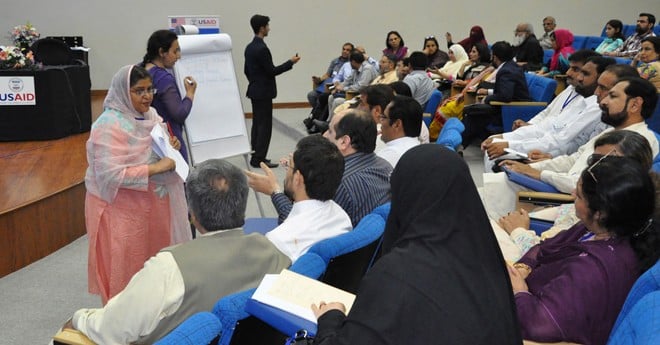

The question of quality in education is something that is discussed ever so often but a plausible mechanism that can be put in place to ensure quality education - a simple and straight formula - is yet to be found. In developing countries such as Pakistan, this debate becomes even more rigorous since the quality of education provided in public schools, operated by the government, is extremely substandard. Stories of children spending multiple years trying to pass a single grade are common. Most children barely understand a single concept when they pass out after 16 years of education.
While private schools are also not exempt from criticism in this regard, it is children in public schools coming from the lower end of the economic strata that suffer the most. Their parents do not have the resources that might help the child get ahead in life -- quality education being the source of better opportunities in life.
A conference organised by the USaid in association with LUMS on April 22, 23, 2014 presented low-fee private schools as a viable economic and social service opportunity. Such schools can play a major role to provide quality education at more affordable rates, and in doing so try and bridge the gap between public and private education.
The conference successfully debunked some myths related to education. The first and foremost amongst these is that people who earn less, especially those sending their students to public institutions, are not interested in their children’s education. Tahir Andrabi, Professor of economics at Pomona College in the US, presented a research study that showed quite the opposite. The research was carried out in the urban Kasur area and showed that the mothers were aware of their child’s performance in school even though 40 per cent of them were illiterate. It also showed that parents were also willing to pay a higher fee to ensure better education for their children.
Another experimental study conducted in Faisalabad by Tahir Andrab’s team showed that school administrations inherently have their priorities wrong. Even when they were given funds (Rs50,000) they were unable to improve the quality of education. This is because most schools seem to spend a large amount of money on infrastructure rather than building resources to improve the functioning of class rooms such as teachers training.
Teacher training was also the core point highlighted by all the speakers in the second session of the training. One major concern of anyone starting a low-fee private school is getting good teachers since those experienced and educated in the relevant fields usually ask for a high pay structure too. Thus, they have to hire people who are not as qualified but will work for less money. This is more of a problem in rural areas where at times people don’t have the means to pursue higher education and so a qualified pool of candidates is not available.
Training teachers by organising workshops and encouraging them to continue their own education is something all successful low-fee private schools practice. Maria Leznicki, vice-president of Brand Strategy at Bridge, a network of low-fee schools in Nairobi and Kenya, and Ali Raza, associated with The Educators, discussed how their organisations have their own trainers to work with teachers on a regular basis.
The focus of schools on infrastructure, though deemed important by all speakers, was given a secondary role. While it is essential that students are given a comfortable environment and space to move around, having large custom-build campuses was declared a luxury.
Another important and rather controversial subject discussed was the treatment of parents and students and customers. The use of the ‘C’ word in terms of education has always received severe criticism, as it did from the audience during the conference as well. However, most panelists disagreed stating that while it is important to educate parents it is also important for the schools to remember that their primary purpose is facilitating the child and ensuring that parents are not wasting their money. And since the aim of the parents is to provide better opportunities to their child by offering them a better education, the school has to ensure that the child performs as well.
Low-fee private schools are being adopted as an option in various developing countries across the board as shown by representation from Bangladesh, India and the Bridge Network that is expanding itself in Africa. Not only can they provide a much sought after alternative but can also help improve government schools by giving a successful model and healthy competition. Unlike NGO-run or government-run schools, these schools can earn a profit. They are more likely to survive in the long term and improve upon their facilities.